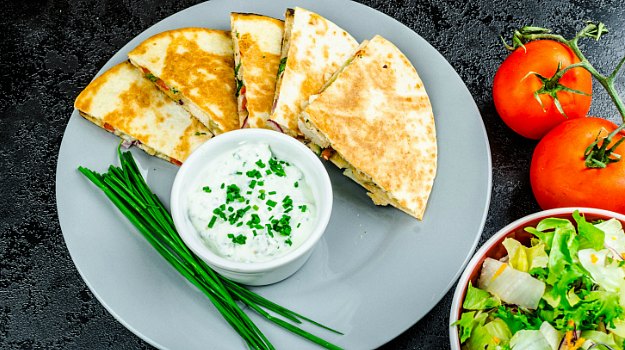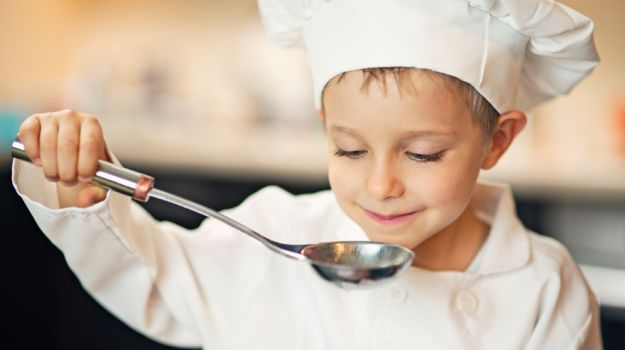Would you let your 2-year-old use a chef's knife? Many people think that sounds not just dangerous, but insane. However, that's what my friend J.M. Hirsch, a prominent food writer and cookbook author, did with his son Parker.I'm a little more conservative (okay, fearful) than he is. My kids were more like 8 when I first let them use a sharp knife in the kitchen. But in my work, I've come across some 6-year-olds who can slice and dice like pros.Just like our kids' maiden voyage down a steep slide, or the moment they wobbled off without training wheels on a bicycle, that first chop through a carrot is terrifying. We're bound to question ourselves and picture them slicing off a fingertip. But if we want our kids to love to cook and to do it with confidence, we need to put aside our fears and let them do more than we are comfortable with in the kitchen.
I've been cooking with parents and kids for nearly two decades. While I've never had a child get hurt in my kitchen or at one of my demos or classes, I have met many parents who are so consumed with worry that they unintentionally drive their kids out of the kitchen.The most upsetting example of this was when I was teaching a group of teenagers at an after-school program in Washington how to prepare a healthy dinner. One boy was so proud that I was letting him dice raw sweet potatoes with a long sharp knife (which you know is not an easy task if you've ever tried it). However, his mom walked in mid-potato and, surprised and scared, screamed at him to stop. I had taught him basic knife skills and was standing right there watching him, but her reaction broke his focus and drained the joy from his accomplishment.I understood this caring mom's reaction - she was trying to protect her beloved child from injury and she hadn't seen him learn to chop safely. But upon reflection, I wondered whether the real fear should be that, in the long term, our kids won't learn to cook at all, and will be consigned to years eating prepared or highly processed foods. That is statistically far more likely to result in disease than cooking is to result in mortal injury.If we really want our kids to love good food and ultimately to be able to shop for and prepare meals when we're out of the picture, we need to seek ways to give them confidence in the kitchen rather than (often inadvertently) driving them away.Here are seven ways we can get a grip on our fears or controlling behaviors and inspire our kids to cook instead:- Let kids cook real food (not just bake cookies). Many of us cherish memories of baking with our parents, and we want to share that experience with our kids - and really, who doesn't love fresh, hot cookies? But to really release our kids' inner chef, we need to encourage them to make other foods they may enjoy eating, such as baked potato chips, sweet potato fries, scrambled eggs, blueberry pancakes, breaded chicken and creamy ranch dressing, all of which will expand their repertoire. Ideally, we want our kids to learn that it's easy to make almost any food they like to eat.- Let kids be in charge. Too often parents take the lead in the kitchen and stay in control for too long. Instead, let the child direct the activity by letting her decide what to make, how to season it (kids love smelling spices) and what to serve it with. Let the child do the actual work, including reading or thinking the entire recipe through first. If she acts as head chef and you serve as sous chef, she is more likely to enjoy the process and ultimately feel empowered to cook independently.- Hot stoves and sharp knives? Bring 'em on. At first, kids are often shocked that I let them cook at the stove and wield a knife. Yes, we most definitely need to teach our kids basic safety skills around heat and sharp objects, but we also need to stretch beyond our fears and comfort zone and empower and trust them to cook safely and responsibly so they won't get bored by just mixing and measuring. It will help them feel a sense of accomplishment and mastery when they are able to make a meal independently from start to finish. (Still nervous? Let them start by slicing a banana with a butter knife.)- Let them make a mess. Don't suck the joy out of cooking by grimacing or groaning every time your child spills some flour on the floor or splashes some soy sauce on the counter (or even on the dish towel). Sure, kids also need to learn that cleaning up is an inevitable result of cooking, and they should help clean up the kitchen after cooking (although in our house we have a rule that the person who cooks dinner is exempt from cleanup duty). But let them get in their flow without worrying about making a mess along the way.- Take a breath. If you are stressed out or rushed when your child wants to cook with you, and you know you need to have dinner on the table in 15 minutes, you may inadvertently send signals to him that cooking is stressful or you don't want his help. If you find yourself snapping at or correcting him constantly while he is in the kitchen, think about cooking together on a calmer evening, a snow day or a weekend instead. Of course, once your child gains cooking skills, he will actually be able to help you get dinner on the table in a hurry.- Stop talking. In cooking with kids (and perhaps parenting in general), the most important lesson I've learned is that the less we say, the better off we all are. Sure, if they ask us a question we should answer, but it's important to keep quiet as often as possible when we feel like directing or correcting, and let them figure stuff out for themselves. (The answer to any cooking question or any technique can easily be found on YouTube.) When you do speak up, try to make all your directions and responses encouraging and positive so the kitchen doesn't become a zone for criticism.- Get out of the room. Especially at first, it can be scary to let our kids cook when we're not standing right there. I remember when my daughter texted me a question about using the food processor alone for the first time while I was at my son's basketball game and I wanted to tell her to wait until I got home - in my head I was screaming "No!" - but I held my tongue. The more we let our kids take risks, take charge and embrace their new kitchen skills, the more likely it is that their inner chef will come out to play.With a few tweaks to our behavior and calming of our nerves, parents (or aunts, uncles, caregivers or grandparents) can get kids excited about cooking. Even if your child doesn't become an Iron Chef, he can learn to make a meal when he is hungry.A few weeks ago, our son Solomon, who is now a freshman in college, demonstrated how developing cooking skills early can pay off. While on a spring break trip to an athletic tournament, the 30 kids on the team planned, shopped for and cooked group dinners all week. Though the menus were basic (burgers, burritos, chili, pasta), no one lost a finger, they saved tons of money and Solomon said that preparing and sharing those dinners was a highlight of the vacation.Aviva Goldfarb is a family dinner expert and founder and CEO of The Six O'Clock Scramble, an online healthy meal planner. Her new bestselling cookbook is "The Six O'Clock Scramble Meal Planner: A Year of Quick, Delicious Meals to Help You Prevent and Manage Diabetes."(c) 2016, The Washington Post
I've been cooking with parents and kids for nearly two decades. While I've never had a child get hurt in my kitchen or at one of my demos or classes, I have met many parents who are so consumed with worry that they unintentionally drive their kids out of the kitchen.The most upsetting example of this was when I was teaching a group of teenagers at an after-school program in Washington how to prepare a healthy dinner. One boy was so proud that I was letting him dice raw sweet potatoes with a long sharp knife (which you know is not an easy task if you've ever tried it). However, his mom walked in mid-potato and, surprised and scared, screamed at him to stop. I had taught him basic knife skills and was standing right there watching him, but her reaction broke his focus and drained the joy from his accomplishment.I understood this caring mom's reaction - she was trying to protect her beloved child from injury and she hadn't seen him learn to chop safely. But upon reflection, I wondered whether the real fear should be that, in the long term, our kids won't learn to cook at all, and will be consigned to years eating prepared or highly processed foods. That is statistically far more likely to result in disease than cooking is to result in mortal injury.If we really want our kids to love good food and ultimately to be able to shop for and prepare meals when we're out of the picture, we need to seek ways to give them confidence in the kitchen rather than (often inadvertently) driving them away.Here are seven ways we can get a grip on our fears or controlling behaviors and inspire our kids to cook instead:- Let kids cook real food (not just bake cookies). Many of us cherish memories of baking with our parents, and we want to share that experience with our kids - and really, who doesn't love fresh, hot cookies? But to really release our kids' inner chef, we need to encourage them to make other foods they may enjoy eating, such as baked potato chips, sweet potato fries, scrambled eggs, blueberry pancakes, breaded chicken and creamy ranch dressing, all of which will expand their repertoire. Ideally, we want our kids to learn that it's easy to make almost any food they like to eat.- Let kids be in charge. Too often parents take the lead in the kitchen and stay in control for too long. Instead, let the child direct the activity by letting her decide what to make, how to season it (kids love smelling spices) and what to serve it with. Let the child do the actual work, including reading or thinking the entire recipe through first. If she acts as head chef and you serve as sous chef, she is more likely to enjoy the process and ultimately feel empowered to cook independently.- Hot stoves and sharp knives? Bring 'em on. At first, kids are often shocked that I let them cook at the stove and wield a knife. Yes, we most definitely need to teach our kids basic safety skills around heat and sharp objects, but we also need to stretch beyond our fears and comfort zone and empower and trust them to cook safely and responsibly so they won't get bored by just mixing and measuring. It will help them feel a sense of accomplishment and mastery when they are able to make a meal independently from start to finish. (Still nervous? Let them start by slicing a banana with a butter knife.)- Let them make a mess. Don't suck the joy out of cooking by grimacing or groaning every time your child spills some flour on the floor or splashes some soy sauce on the counter (or even on the dish towel). Sure, kids also need to learn that cleaning up is an inevitable result of cooking, and they should help clean up the kitchen after cooking (although in our house we have a rule that the person who cooks dinner is exempt from cleanup duty). But let them get in their flow without worrying about making a mess along the way.- Take a breath. If you are stressed out or rushed when your child wants to cook with you, and you know you need to have dinner on the table in 15 minutes, you may inadvertently send signals to him that cooking is stressful or you don't want his help. If you find yourself snapping at or correcting him constantly while he is in the kitchen, think about cooking together on a calmer evening, a snow day or a weekend instead. Of course, once your child gains cooking skills, he will actually be able to help you get dinner on the table in a hurry.- Stop talking. In cooking with kids (and perhaps parenting in general), the most important lesson I've learned is that the less we say, the better off we all are. Sure, if they ask us a question we should answer, but it's important to keep quiet as often as possible when we feel like directing or correcting, and let them figure stuff out for themselves. (The answer to any cooking question or any technique can easily be found on YouTube.) When you do speak up, try to make all your directions and responses encouraging and positive so the kitchen doesn't become a zone for criticism.- Get out of the room. Especially at first, it can be scary to let our kids cook when we're not standing right there. I remember when my daughter texted me a question about using the food processor alone for the first time while I was at my son's basketball game and I wanted to tell her to wait until I got home - in my head I was screaming "No!" - but I held my tongue. The more we let our kids take risks, take charge and embrace their new kitchen skills, the more likely it is that their inner chef will come out to play.With a few tweaks to our behavior and calming of our nerves, parents (or aunts, uncles, caregivers or grandparents) can get kids excited about cooking. Even if your child doesn't become an Iron Chef, he can learn to make a meal when he is hungry.A few weeks ago, our son Solomon, who is now a freshman in college, demonstrated how developing cooking skills early can pay off. While on a spring break trip to an athletic tournament, the 30 kids on the team planned, shopped for and cooked group dinners all week. Though the menus were basic (burgers, burritos, chili, pasta), no one lost a finger, they saved tons of money and Solomon said that preparing and sharing those dinners was a highlight of the vacation.Aviva Goldfarb is a family dinner expert and founder and CEO of The Six O'Clock Scramble, an online healthy meal planner. Her new bestselling cookbook is "The Six O'Clock Scramble Meal Planner: A Year of Quick, Delicious Meals to Help You Prevent and Manage Diabetes."(c) 2016, The Washington Post
Advertisement









